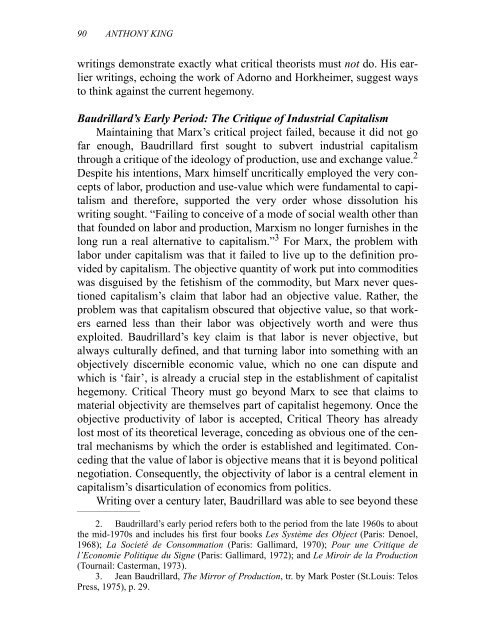King Baudrillard Telos.pdf - Exeter Research and Institutional ...
King Baudrillard Telos.pdf - Exeter Research and Institutional ...
King Baudrillard Telos.pdf - Exeter Research and Institutional ...
You also want an ePaper? Increase the reach of your titles
YUMPU automatically turns print PDFs into web optimized ePapers that Google loves.
90 ANTHONY KING<br />
writings demonstrate exactly what critical theorists must not do. His earlier<br />
writings, echoing the work of Adorno <strong>and</strong> Horkheimer, suggest ways<br />
to think against the current hegemony.<br />
<strong>Baudrillard</strong>’s Early Period: The Critique of Industrial Capitalism<br />
Maintaining that Marx’s critical project failed, because it did not go<br />
far enough, <strong>Baudrillard</strong> first sought to subvert industrial capitalism<br />
through a critique of the ideology of production, use <strong>and</strong> exchange value. 2<br />
Despite his intentions, Marx himself uncritically employed the very concepts<br />
of labor, production <strong>and</strong> use-value which were fundamental to capitalism<br />
<strong>and</strong> therefore, supported the very order whose dissolution his<br />
writing sought. “Failing to conceive of a mode of social wealth other than<br />
that founded on labor <strong>and</strong> production, Marxism no longer furnishes in the<br />
long run a real alternative to capitalism.” 3 For Marx, the problem with<br />
labor under capitalism was that it failed to live up to the definition provided<br />
by capitalism. The objective quantity of work put into commodities<br />
was disguised by the fetishism of the commodity, but Marx never questioned<br />
capitalism’s claim that labor had an objective value. Rather, the<br />
problem was that capitalism obscured that objective value, so that workers<br />
earned less than their labor was objectively worth <strong>and</strong> were thus<br />
exploited. <strong>Baudrillard</strong>’s key claim is that labor is never objective, but<br />
always culturally defined, <strong>and</strong> that turning labor into something with an<br />
objectively discernible economic value, which no one can dispute <strong>and</strong><br />
which is ‘fair’, is already a crucial step in the establishment of capitalist<br />
hegemony. Critical Theory must go beyond Marx to see that claims to<br />
material objectivity are themselves part of capitalist hegemony. Once the<br />
objective productivity of labor is accepted, Critical Theory has already<br />
lost most of its theoretical leverage, conceding as obvious one of the central<br />
mechanisms by which the order is established <strong>and</strong> legitimated. Conceding<br />
that the value of labor is objective means that it is beyond political<br />
negotiation. Consequently, the objectivity of labor is a central element in<br />
capitalism’s disarticulation of economics from politics.<br />
Writing over a century later, <strong>Baudrillard</strong> was able to see beyond these<br />
2. <strong>Baudrillard</strong>’s early period refers both to the period from the late 1960s to about<br />
the mid-1970s <strong>and</strong> includes his first four books Les Système des Object (Paris: Denoel,<br />
1968); La Societé de Consommation (Paris: Gallimard, 1970); Pour une Critique de<br />
l’Economie Politique du Signe (Paris: Gallimard, 1972); <strong>and</strong> Le Miroir de la Production<br />
(Tournail: Casterman, 1973).<br />
3. Jean <strong>Baudrillard</strong>, The Mirror of Production, tr. by Mark Poster (St.Louis: <strong>Telos</strong><br />
Press, 1975), p. 29.
















